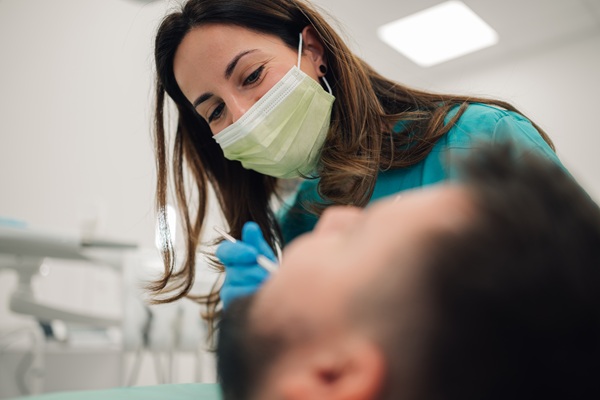How Tooth Decay and Gum Disease Are Connected

Most dental issues (predominantly tooth decay and gum disease) are caused by plaque, a sticky bacterial film. Continue reading to learn how tooth decay and gum disease are connected. This is why bacterial plaque is often the focus of rigorous at-home oral care regimens and regular dental exams.
Bacterial plaque and tooth decay
Plaque bacteria thrive by coexisting in areas where they can easily accumulate in the mouth. If bacteria can build up on the teeth, they begin producing acids from the debris of foods and beverages. Due to the stickiness of plaque, these acids may bond to the teeth and erode the enamel, initiating the process of dental decay. Most of the acid production happens after meal consumption. This means the teeth are at risk of developing plaque within a few minutes after consuming a meal or drink.
Tartar accumulation and gum disease
The same bacterial acids that eat away at tooth enamel may also cause infection of the gum tissue and the bone that supports the teeth. When plaque is not completely removed from the teeth, it hardens into tartar. Tartar accumulation provides a thriving condition for gum disease. It has a cumulative effect — tartar forms as plaque continue to build upon the teeth. As a result, additional plaque adheres to this tartar, and the process continues.
The first and mild form of gum disease, called gingivitis, causes the gums to become red, inflamed, and readily bleeding. Plaque attaches to the tooth and gum line, irritating the area surrounding the teeth. Allowing plaque and tartar to build up along the gumline and behind the gums allows bacterial toxins to destroy the bone and ligaments around the teeth. This leads to the advanced stage of gum disease, known as periodontitis.
The following are some important tips for tooth decay and gum disease prevention:
Fluoride treatment
If the tooth enamel is weak, the teeth will be less able to fight the effects of bacterial acids. However, there is a simple approach to maintaining healthy and strong tooth enamel. Fluoride toothpaste can help remineralize and fortify the enamel. Additionally, the dental professional will inquire about additional fluoride sources, like mouthwashes, supplements, or varnishes.
Maintain excellent oral health care
Poor oral hygiene increases the risk of gum disease and tooth decay. Bacteria multiply faster when they are not cleaned off regularly. Dentists suggest brushing and flossing at least twice daily, making sure to clean the plaque that often accumulates along the gum line and between the teeth.
Once plaque hardens into tartar, it cannot be cleaned off with a toothbrush. Therefore, patients need to visit the dentist regularly for cleaning and checkups. Before more severe dental problems develop, the dental professional will discover and treat any decay or gum issues during these sessions.
The bottom line
The one thing connecting gum disease and tooth decay is bacterial plaque. With a diligent personal oral care routine and regular visits to the dentist, you can maintain good oral health.
Request an appointment here: https://yourbrilliantsmile.com or call Kevin S. Bone D.D.S. at (989) 272-4253 for an appointment in our Saginaw office.
Check out what others are saying about our dental services on Yelp: Gum Disease in Saginaw, MI.
Recent Posts
Gum disease is an infection that causes damage to the soft tissue and bone within the mouth. There are multiple stages of gum disease, in which the soft tissues and bone become more infected. A lot of sufferers from gum disease wonder what the healing process looks like, and if it is even possible. Thankfully,…
Gum disease is an infection of the soft tissues within the mouth. Many people suffer from a form of gum disease without even realizing it. The gums often get overlooked during oral hygiene, which can make it easy to miss the signs. Keep reading to learn more about what the signs look like. Outlined below are…
Concerned about oral cancer? Read on to learn about oral cancer screenings as part of your regular dental checkup. During a regular dental visit, a general dentist will typically screen patients for signs of oral cancer. Alternatively, you may be informed that you have oral cancer risk factors and should visit a dentist about them.…
Thinking about getting an oral cancer sceening? Oral cancer screenings are a very important part of general dental care as they ensure the health of patient's oral cavity. They involve a few steps that are typically painless. Understanding the process of an oral cancer screening can be helpful for patients who are not sure what…


